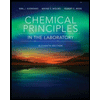For the following reaction, K = 2.7×108 at 300 K. 3 H2(g) + N2(g) = 2 NH3(g) In an experiment carried out at 300 K, the initial concentrations of H2(g) and N2(g) are each equal to 2.0 mol L -1 Which of the following statements about the equilibrium concentrations is correct? Note: In the statements below, << means "much less than". O [H2] = [N2]< [NH3] O [H2] << [N2]~ [NH3] O [H2] - [N2] = [NH3] O [N2] << [H2] < [NH3] O [NH3] << [N2] ~ [H2]
For the following reaction, K = 2.7×108 at 300 K. 3 H2(g) + N2(g) = 2 NH3(g) In an experiment carried out at 300 K, the initial concentrations of H2(g) and N2(g) are each equal to 2.0 mol L -1 Which of the following statements about the equilibrium concentrations is correct? Note: In the statements below, << means "much less than". O [H2] = [N2]< [NH3] O [H2] << [N2]~ [NH3] O [H2] - [N2] = [NH3] O [N2] << [H2] < [NH3] O [NH3] << [N2] ~ [H2]
Chemistry: Principles and Reactions
8th Edition
ISBN:9781305079373
Author:William L. Masterton, Cecile N. Hurley
Publisher:William L. Masterton, Cecile N. Hurley
Chapter12: Gaseous Chemical Equilibrium
Section: Chapter Questions
Problem 14QAP: Consider the following reaction at 1000 C: NO(g)+12 Cl2(g)NOCl(g) (a) Write an equilibrium constant...
Related questions
Question
12
![For the following reaction, K = 2.7×10% at 300 K.
3 H2(g) + N2(g) = 2 NH3(g)
In an experiment carried out at 300 K, the initial concentrations of H2(g) and N2(g) are each equal to 2.0 mol L
-1
Which of the following statements about the equilibrium concentrations is correct?
Note: In the statements below, << means "much less than".
[H2] = [N2] << [NH3]
[H2] << [N2] = [NH3]
[H2] = [N2] = [NH3]
[N2] << [H2] < [NH3]
[NH3] << [N2] [H2]](/v2/_next/image?url=https%3A%2F%2Fcontent.bartleby.com%2Fqna-images%2Fquestion%2Fa01bd448-144d-4db2-affa-97c00487c9fd%2F316671a7-d074-4c8d-8c86-ea0b044819cd%2Fgqv6pb_processed.png&w=3840&q=75)
Transcribed Image Text:For the following reaction, K = 2.7×10% at 300 K.
3 H2(g) + N2(g) = 2 NH3(g)
In an experiment carried out at 300 K, the initial concentrations of H2(g) and N2(g) are each equal to 2.0 mol L
-1
Which of the following statements about the equilibrium concentrations is correct?
Note: In the statements below, << means "much less than".
[H2] = [N2] << [NH3]
[H2] << [N2] = [NH3]
[H2] = [N2] = [NH3]
[N2] << [H2] < [NH3]
[NH3] << [N2] [H2]
Expert Solution
This question has been solved!
Explore an expertly crafted, step-by-step solution for a thorough understanding of key concepts.
Step by step
Solved in 2 steps with 2 images

Knowledge Booster
Learn more about
Need a deep-dive on the concept behind this application? Look no further. Learn more about this topic, chemistry and related others by exploring similar questions and additional content below.Recommended textbooks for you

Chemistry: Principles and Reactions
Chemistry
ISBN:
9781305079373
Author:
William L. Masterton, Cecile N. Hurley
Publisher:
Cengage Learning

Chemistry: An Atoms First Approach
Chemistry
ISBN:
9781305079243
Author:
Steven S. Zumdahl, Susan A. Zumdahl
Publisher:
Cengage Learning


Chemistry: Principles and Reactions
Chemistry
ISBN:
9781305079373
Author:
William L. Masterton, Cecile N. Hurley
Publisher:
Cengage Learning

Chemistry: An Atoms First Approach
Chemistry
ISBN:
9781305079243
Author:
Steven S. Zumdahl, Susan A. Zumdahl
Publisher:
Cengage Learning


Chemistry
Chemistry
ISBN:
9781305957404
Author:
Steven S. Zumdahl, Susan A. Zumdahl, Donald J. DeCoste
Publisher:
Cengage Learning

Chemical Principles in the Laboratory
Chemistry
ISBN:
9781305264434
Author:
Emil Slowinski, Wayne C. Wolsey, Robert Rossi
Publisher:
Brooks Cole

Principles of Modern Chemistry
Chemistry
ISBN:
9781305079113
Author:
David W. Oxtoby, H. Pat Gillis, Laurie J. Butler
Publisher:
Cengage Learning